- Home
- Thomas E. Sniegoski
In the House of the Wicked rc-5
In the House of the Wicked rc-5 Read online
In the House of the Wicked
( Remy Chandler - 5 )
Thomas E. Sniegoski
Thomas E. Sniegoski
In the House of the Wicked
PROLOGUE
Occupied Poland, Dachau 1943
It was cold in the interrogation hut, and Konrad Deacon wondered how much longer it would be.
For a moment he considered that the man he wished to speak with had already met his fate in the chambers, that the invaluable information he held in his mind was lost to the ages as suffocating gas filled his lungs, and all that he had been was turned to smoke and ash within the fires of the crematorium.
It was a disturbing thought, and one that Deacon did not wish to dwell upon as he sat in the wooden chair behind the simple desk, clutching his leather satchel to his chest, waiting for the man promised by Reichsfuhrer Himmler himself.
The information Deacon hoped to receive from this man was priceless, and should be more than enough to finally allow him membership in the cabal. He’d been trying to gain a seat for years, but now he believed he had found something that would finally force the gathering of the world’s most powerful sorcerers to recognize him.
He squirmed impatiently in the chair, then pulled up the edge of his purple leather glove to check the time. He’d been waiting twenty minutes, but it might as well have been twenty hours, as far as he was concerned.
Konrad Deacon was not accustomed to waiting, and contemplated voicing his displeasure to der Fuhrer when next they met to review Adolf Hitler’s astrological chart.
Yes, Hitler was indeed a madman, but even madmen were useful. Let him have the world if it would reveal to Konrad the mysteries of the universe beyond the pale.
The sudden sound of heavy-booted feet made him gasp, and Deacon looked toward the door in anticipation. He stood, satchel still clutched to his chest, watching as the door swung open and armed soldiers roughly pushed a tattered old man inside.
Deacon studied the hunched figure. He was clothed only in the filthy, shapeless, striped uniform of the concentration camp; worn leather shoes missing their laces were on his feet. His hair had been shorn to the skull, his once-impressive beard cut away. But even in this desolate state the old man radiated something special.
It was a power passed down from the ages, a power that would be no more once this vessel met its inevitable end. Which was why Deacon had come to this godforsaken place, to speak with this godforsaken man.
The old man shivered as he gazed about the interrogation shed, his dark, sunken eyes clearly wondering why he had been brought here, what new horrors awaited him.
“Rabbi Eshed,” Deacon acknowledged the man, unable to suppress a smile.
Eshed stumbled back, as if repelled by Deacon’s joy in such a loathsome environment. The holy man turned his gaze toward the guards who still waited at the door, then back to Deacon.
“You may wait outside,” Deacon told the pair.
They hesitated, giving each other a worried look.
“I take full responsibility for the prisoner,” Deacon reassured them. “And I will be sure that Reichsfuhrer Himmler hears of your excellent service.” He lifted a gloved hand and motioned them out.
“Much better,” Deacon said, as the guards stepped outside and closed the door. Then he gestured at the chair positioned directly in front of the desk. “Please sit,” he said to Eshed, and he sat again, the wooden chair creaking under his weight.
Eshed didn’t move.
“Sit,” Deacon repeated, an edge to his voice. “I insist.”
“Why have I been brought here?” Eshed asked, moving slowly toward the chair.
Deacon did not answer, silently watching the old rabbi as he carefully lowered himself into the chair.
“Thank you,” Deacon finally said. He placed his leather satchel down upon the desk and reached inside to remove a leather-bound journal. “You wouldn’t believe the pest I made of myself trying to locate you, Rabbi.”
“Locate me?” the old man asked. He sat stiffly, eyes darting warily about. “For what reason?”
Deacon placed the satchel on the floor against the chair leg, then centered the journal on the table in front of him. He removed his gloves and put them in the pockets of his coat. Then he opened the journal to where a pen had marked his place.
“At first I believed the stories to be nonsense,” Deacon said as he removed the pen’s cover and placed it on the table beside the book. “But then I continued to hear them, and I began to wonder if they might, after all, be true.”
Deacon looked up, running his bare hand over the creamy white surface of the blank page.
“Stories,” the old man repeated. “What stories have you heard?”
Deacon smiled again.
“One about a battalion of fine German soldiers assigned to purge a tiny Polish village of its Jewish influence, only to be ruthlessly killed by a monster.”
He watched the old man’s eyes, searching for a hint.
“A monster made of clay.”
Still the old Jew showed nothing.
“A monster brought to life using ancient magicks long believed lost with the passage of time,” Deacon continued.
“Fairy tales,” Eshed grunted.
“Excuse me?”
“You have brought me here to discuss fanciful tales told to children to make them behave-to eat their vegetables and to go to sleep when they are told. Yes, of course I know these stories well. I heard them from my own parents and told them to my-”
“You misunderstand me, Rabbi,” Deacon interrupted, feeling his ire begin to rise. “I talk not of fairy tales, but of actual eyewitness reports that-”
“Drunks and fools,” Rabbi Eshed spat. He managed what appeared to be a smile, though it could very well have been a grimace of pain.
“Let me be certain that I understand. You are calling soldiers of the Third Reich drunks and fools?”
“Perhaps they concoct such fantastic stories to deflect the truth that a village of farmers and craftsmen were able to defeat so many of their number. Of course it was a golem that stopped them… What else could possibly have stopped the fuhrer’s expert soldiers?”
The old Jew actually laughed then, a horrible sound that said so much of how the holy man felt about his captors.
“I said nothing about a golem, Rabbi Eshed,” Deacon said.
“Everyone knows the tales,” the rabbi countered. “A man of clay brought to life by supernatural means to avenge the offended.”
Deacon slowly nodded. “Of course, of course,” he murmured, running the smooth part of his thumb up and down the shaft of his pen. “But what of those from your village? Those who, to spare their own lives, swore that the golem was indeed real and that it was you who brought it to life.”
“Many would swear to almost anything if they believed it would grant them another few moments of life,” Eshed said.
“Do you honestly believe that’s true, Rabbi?” Deacon asked, feigning a sad smile. “That your people would swear to a lie before meeting their maker?”
“We believe in the afterlife, but doubt of its existence is never stronger than when we are faced with death. Some cling desperately to what they already know rather than face the uncertainty of the unknown.”
“How about you?” Deacon asked. “Do you fear the unknown?”
The old Jew shook his shaggy head. “I do not,” he said. “For I know that Paradise is waiting.”
“Then all of this”-Deacon lifted his hand, gesturing to indicate the world outside the shack, the concentration camp-“it means nothing.”
The old man did not answer, but his eyes were intense as they bored into Deacon’s
.
“And what of your family?” Deacon asked. “Do they believe as you?”
There. Deacon saw the slight flicker in the holy man’s gaze.
“My family is…”
“Your daughter-in-law,” Deacon continued. “And two grandchildren, if I’m not mistaken.” He reached into the pocket of his coat and removed a folded piece of paper. “Jacob and Hannah,” he said, looking up from the names. “Perhaps I shouldn’t have stopped their executions…perhaps I should have allowed them to feel the embrace of your God.”
“They are alive?” the old man asked.
Is that a spark of hope in his ancient eyes? Deacon certainly hoped so.
“Jacob is quite proud of his grandpa,” he said. “The stories he told me…and little Hannah, as well.”
The rabbi looked down at the floor.
“But, of course, they’re just children,” Deacon said. “Repeating fairy stories told to make them eat and go to bed.”
“Exactly,” Rabbi Eshed said, his gaze still on the floor.
“But what if their stories were true?” Deacon mused. “How wonderful would it be if Jacob and Hannah’s beloved grandpa could create a man made from clay and bring it to life, to thwart their enemies? What a world this would be, eh?” He placed his hands on either side of the open journal. “It would be a world that Jacob and Hannah could live in for quite some time, a world filled with magick.”
The old man finally met Deacon’s gaze.
“I could give them that world,” Deacon pressed. “I could see that they were taken from this place.”
It was indeed hope that he had seen in the holy man’s eyes, and now it burned out of control.
Deacon knew that he was close and carefully reached for his pen. “For the sake of Jacob and Hannah-”
“What…what do you wish to know?” Eshed asked, defeated.
Deacon set pen to paper.
“Tell me everything.”
Eshed spoke for hours.
Once the words began, there was no holding them back. Some of what he had to say was already familiar to Deacon, but there was much that wasn’t, so many details…multifaceted pieces of information that finally revealed the magnitude of it all.
They were at it for hours: spells, diagrams, formulas, and words. The rabbi gave him everything Deacon would need to create his own man of clay and to improve upon it.
When they had begun, the journal was empty, and now it was nearly filled. Deacon felt an overwhelming sense of joy and accomplishment as he flipped through the pages. There was so much work to be done now that he had all the missing pieces.
He’d become so engrossed with what he had collected that the sudden appearance of the two guards surprised him. But then he remembered where he was and who had helped to fill the sucking void of arcane knowledge that had eluded him for so long.
Rabbi Eshed still sat across from him, looking far smaller than when he’d first entered the room. It was as if all the knowledge he had revealed had somehow caused him to diminish in size.
The guards stared from the open door, the cold, Polish winter flowing into the confines of the tiny room. Deacon’s time with Rabbi Eshed was at an end.
He pulled his purple gloves from his coat pockets and jammed his freezing hands into them. Then he closed his burgeoning journal, retrieved his leather satchel, and slid his prize inside.
The old man watched his every action with growing anticipation.
Deacon stood and, clutching the satchel protectively to his chest, walked around the desk and past the old rabbi. Eshed turned in his chair and reached out to grab the sleeve of his cashmere coat.
The guards moved, but Deacon stopped them with a glance. He turned his gaze to the old man.
“My grandchildren,” the rabbi said hesitantly. “You…you said that if I were to tell you…that they would be safe.”
Deacon pulled his arm from the old man’s desperate clutches.
“Rest assured, they are in a better place,” Deacon said coldly, watching as the realization sank in and the light of hope that had been in the old rabbi’s eyes was extinguished.
“They…they are already dead,” Eshed proclaimed, the weight of the words seeming to crush him down even farther into the chair.
“Freed from the horrors of this world, so they can find peace in the next,” Deacon said, feeling no shame. “I will be sure to tell Reichsfuhrer Himmler of your excellent service to me,” he again praised the guards as he passed between them on his way out the door.
“Herr Deacon,” boomed the rabbi’s voice from the cold space behind him. It was as if he’d been grabbed by the shoulder and spun around to face the old Jew, who still had not risen from his chair.
“Another piece of information I give to you of my own free will.” A new fired burned in Rabbi Eshed’s eyes. “There will be a special darkness for you,” he proclaimed, as if knowing the words he spoke were undeniably true. “For you and all who would dare to love you.”
Then the rabbi abruptly turned his back to Deacon.
Finished with him.
Finished with this world.
Waiting for Heaven.
CHAPTER ONE
It had been quite some time since Remy had last listened.
That was why he was here, standing before the high front gates of the New Hampshire Correctional Facility, staring at the harsh angles of the prison beyond.
He had come because he had listened again.
Thunder crashed, lightning pulsed across the nighttime sky, and rain fell in straight sheets to the earth. Remy was soaked to the skin, but he didn’t give it a thought, his mind occupied with the reason for his being in this inhospitable place on this most inclement of evenings.
He had come in answer to a prayer.
A prayer that he, a former emissary of Heaven, had overheard as someone had pleaded for God’s attention. And although Remy had struggled to block out those prayers in his quest to be human, tonight he had heard and was compelled to act.
Invisible to the video cameras that watched the comings and goings from the prison, Remy spread his powerful wings to their full span and, with a single mighty thrust, lifted himself up and over the fence to the open yard beyond.
The world was changing. He could smell it in the air, taste it on the tip of his tongue, feel it like a faint electric current on the surface of his skin. Remy knew it had to do with how close the earth had come to the Apocalypse a year or two back, a catastrophe that he had had a major role in averting. Ever since then, life had been growing stranger, deadlier, with every passing day-as if being that close to the end had set the world on a different path.
Stirred things up like silt from the bottom of a lake.
Remy had changed, as well, for the love of his life had died, and without her strength, he’d found himself fighting to hold on to the humanity that he’d worked so hard to fabricate. His human nature had begun to tatter, his angelic essence trying to assert itself as he drifted further away from the mundane existence he had created as a private investigator-and husband.
But as the world that he loved-and fought for-continued to transform, Remy had to face the fact that the warlike nature of the Seraphim was needed. If he was going to continue to protect this changing world and all he loved from the rapidly escalating supernatural threats, the two warring natures at the core of his being would have to unite.
Finally, with the help of the memory of his beloved Madeline, Remy had embraced a side of his nature that he had been attempting to stifle for thousands of years. Remy Chandler was transformed.
Whole.
The human and the angelic were one. He was a creature of both Earth and Heaven, and tonight he had chanced a listen to the prayers of humanity. It was a mother’s plea that had touched him tonight, compelling both the human and the Seraphim to action.
Remy walked across the puddle-covered blacktop of the prison yard and stopped beside a guard who stood outside the main entrance, smoking a cigarette be
neath an overhang. Patiently, he waited in the steady fall downpour as the man finished his smoke, then followed him into the brightly lit building, the heavy metal door slamming closed behind them.
Remy had been relaxing on the roof of his Beacon Hill brownstone, sipping a glass of Scotch as his canine friend, Marlowe, snored loudly at his feet. The rain hadn’t started, but the dampness permeated the air, and he’d known that it was only a matter of time before it did.
He had seen the glow of the lights at Fenway Park and absently wondered if the Sox would be able to get their game in before the deluge. He had allowed the effects of the alcohol to wash over him. His psychic connection to the world’s inhabitants danced in the corners of his perception. Normally he would have blotted it out, not wanting to eavesdrop on the pleas of the needy and devout, but something about this particular night had encouraged him to open himself up to the cacophony of prayers.
It had been like being in a sea of sound, a multitude of voices in every worldly dialect, all speaking at the same time.
Remy had been tempted to pull back from the deafening roar but forced himself to concentrate, whittling down the sounds of many to a select few, until he was focusing on only one, the strongest and most plaintive of them all.
The prayers of Catherine Perlas.
Remy was deep inside the prison now. The noxious smell of violence and desperation hung stagnant in the air, despite the nearly overwhelming stink of industrial cleaner. He’d left his escort to wander on his own and was passing the prison infirmary when his acute hearing picked up the sound of heavy breathing-someone fast asleep.
He stepped inside a darkened office to find an older man sleeping at his desk, file folders spread out before him as if sleep had claimed him in the midst of work. Silently, Remy approached the man.
“Robert Denning,” he said softly in the voice of an angel.
The man twitched with a grunt and slowly raised his head, leaving a small puddle of drool on one of the folders. He looked around the room, bleary-eyed and still mostly asleep, searching for the source of the voice.

 Dark Exodus
Dark Exodus A Hundred Words for Hate rc-4
A Hundred Words for Hate rc-4 The Fallen
The Fallen Where Angels Fear to Tread rc-3
Where Angels Fear to Tread rc-3 Armageddon
Armageddon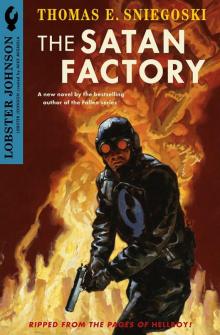 The Satan Factory
The Satan Factory In the House of the Wicked: A Remy Chandler Novel
In the House of the Wicked: A Remy Chandler Novel A Hundred Words for Hate
A Hundred Words for Hate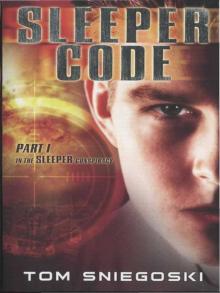 Sleeper Code
Sleeper Code The Demonists
The Demonists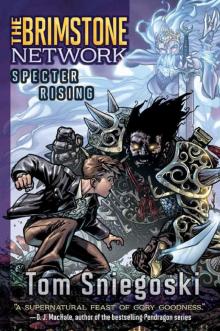 Specter Rising (Brimstone Network Trilogy)
Specter Rising (Brimstone Network Trilogy)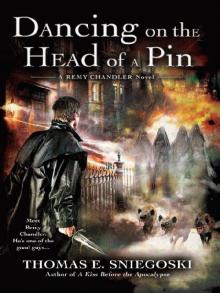 Dancing on the Head of a Pin
Dancing on the Head of a Pin The Shroud of A'Ranka (Brimstone Network Trilogy)
The Shroud of A'Ranka (Brimstone Network Trilogy)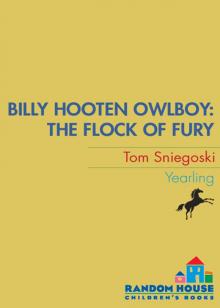 The Flock of Fury
The Flock of Fury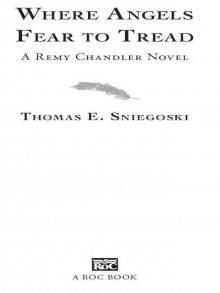 Where Angels Fear to Tread
Where Angels Fear to Tread Leviathan
Leviathan Walking In the Midst of Fire: A Remy Chandler Novel
Walking In the Midst of Fire: A Remy Chandler Novel Billy Hooten
Billy Hooten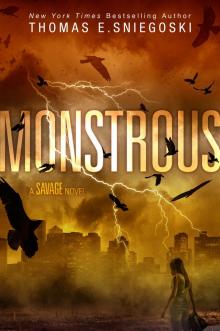 Monstrous
Monstrous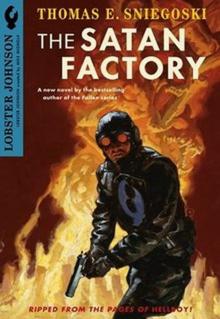 Lobster Johnson: The Satan Factory
Lobster Johnson: The Satan Factory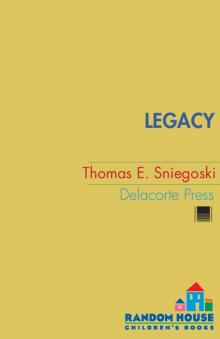 Legacy
Legacy Savage
Savage Walking In the Midst of Fire rc-6
Walking In the Midst of Fire rc-6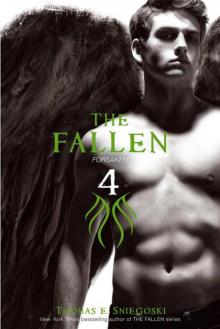 The Fallen 4
The Fallen 4 A Deafening Silence In Heaven
A Deafening Silence In Heaven A Kiss Before the Apocalypse
A Kiss Before the Apocalypse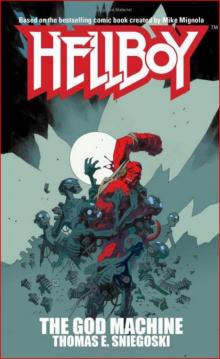 The God Machine
The God Machine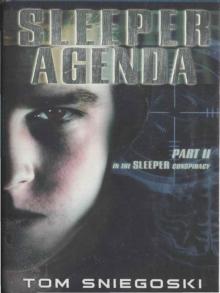 Sleeper Agenda
Sleeper Agenda The Girl with the Destructo Touch
The Girl with the Destructo Touch Dancing On the Head of a Pin rc-2
Dancing On the Head of a Pin rc-2 In the House of the Wicked rc-5
In the House of the Wicked rc-5 Reckoning f-4
Reckoning f-4 The Fallen 3
The Fallen 3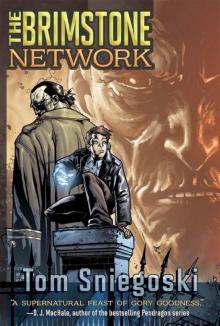 The Brimstone Network (Brimstone Network Trilogy)
The Brimstone Network (Brimstone Network Trilogy)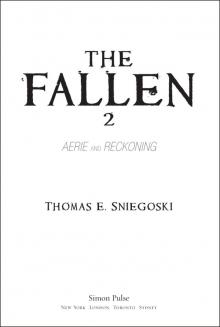 The Fallen 2
The Fallen 2 The Fallen f-1
The Fallen f-1